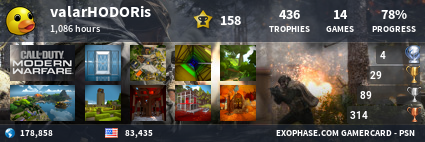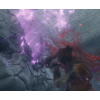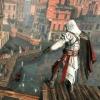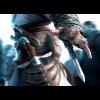[Retrospective] 8 Reasons AC1 Is Still The Best ((not mine))
[CopyPasted entire article from the Source-link at the bottom.]
[I posted this first on my Facebook timeline. Aurel suggested it come to THB, so why not.]
Written by Carol Pinchefsky
1. Synchronization and Health
In AC1, there’s no such thing as health or armor. There’s just synchronization—how close you (Desmond Miles) could faithfully recreate the actions of ancestor Altair. If you got hurt or fell off a building, you lost synchronization. Why? Because you suck, I mean, you weren’t as good an assassin as Altair, that’s why. The real Altair was too nimble to fall of a building, too stealthy to attract attention, and more lethal than Agent 47 (ooo, I went there). That’s why killing bystanders also cost you synchronization: You weren’t performing compatibly with the memory you were trying to retrieve. It’s a brilliant concept.
The sequels totally miss the point of how synchronization drives the first game. They introduce actual health, which could be restored with health tonics. In other words, medieval assassin Ezio actually does get thwacked upside the head by that Brute, no matter what you “remembered” him doing. (This means that Altair, who did not miss his jumps, is a definitively better assassin than Ezio. Ooo, I went there again.)
Replacing synchronization-as-health with real health has more impact than turning your blunders into historical footnotes, though….
2. Death and rebirth
In AC1, death is just a particularly bad sync-up; you replayed Altair’s actions so badly you lost touch with the original memory entirely; literally, you “lost the plot.” So the Animus has to reinitialize and drop you back earlier in the memory for you to try again.
For one of the very few times in a videogame, there’s an in-game justification for returning to the last checkpoint—in the context of the Animus, it actually makes sense. Only Bioshock‘s Vita-Chambers come close to justifying your ability to recover from death within the game’s continuity.
The sequels miss this too. Now you have health, and Ezio actually dies when you run out of it. Restarting from the checkpoint really is a game mechanic. Yes, you can argue the Animus is still resetting you, but you died from lack of health, not loss of synchronization, so this rationale is on much shakier ground. Synchronization no longer makes sense.
3. Flags and feathers
Although I prefer AC1, even I admit that collecting flags was almost entirely pointless. Sure, it restores health and provides a save point. Collecting all of the flags for a given area got you an extra synchronization bar unconnected to the main plot or memories. (If you actually collected all of them, I am truly sorry.)
But those flags weren’t real. (Others may argue this point. They’re wrong.) That’s why they sparkle: they’re projections of the Animus. Altair never saw them, You do, because you’re seeing them through the eyes of Desmond, who is reliving Altair’s memories. I always assumed that each flag represented a place Altair stood, only if for a moment. By occupying the same spot, you’re synched that little bit more—you’re closer to him, if you like.
So what do we get in AC2? Eagle feathers. Hard to find, like the flags, and a challenge to reach because that’s how the AC games roll. But in AC2, the feathers are real. You give them to Ezio’s mother, because collecting enough of them will cure her of grieving over Ezio’s younger brother’s death.
Because they were real, the feathers shouldn’t have been sparkling with Animus-ity. The sparkle represents things projected into the world that Desmond sees that weren’t present to his ancestor, such as the walls that block you from areas your ancestor hasn’t yet remembered going into.
The feathers break that rule. A quibble perhaps, but it underlines my impression that the developers of the AC sequels never quite understood how the concepts of the original Assassin’s Creed worked.
4. A view to a kill
The first AC also suffered from repetitive game play elements. Each assassination played out much like the last in the build-up stages of casing the joint and scoping out the target. In the sequels, assassinations are melded into the storyline (or side quests). They don’t feature as Ezio’s job, per se—unlike Altair, Ezio was an Assassin, but not so much an assassin (whatever Lorenzo di Medici, or the number of guards piled around his feet, think).
But the idea, however much it was repeated, was a good one that I missed in the sequels: In order to unlock the actual assassination memory, you had to recall (i.e., play out) enough of Altair’s reconnaissance first. You didn’t have to recall every piece of it, just enough to grant entrance to the final memory of the segment, the actual assassination. The element of surveillance was an excellent concept that doesn’t really appear in the sequels, as all the missions are story-driven and so simply guide you to your next action.
If you did all of Altair’s legwork, you synched up more bars of the memory. As a nice touch, you could go back and fill in missing bars later, once you’ve unlocked the full memory. Now parts of Altair’s life are now essentially random-access to you. Which brings me to…
5. Live long and prosper
As I said, you don’t have health in AC1, you have synchronization. The more of it you have, the closer to Altair’s pinnacle of awesomeness you were. But it’s better than that. The more memory synchronization bars you filled, the longer the synchronization status bar became. Or in other words, the more “life” you had.
Of course, many games reward you with more overall endurance the more you play, and many games also have automatic healing. But in many games—including AC2 and its sequels—there’s absolutely no reason for how you, as a normal, if very fit, human being can either heal back to full health in minutes or double your overall health in days. Since health is real in those games, it’s just a gameplay mechanic like everywhere else.
AC1 justifies the hell out of your increasing endurance. Because the point of the game is to relive your ancestor’s memory, the more of Altair’s life you’ve relived to date, the more you can screw up without losing touch with him. Even the reconnaissance parts of the individual assassinations bolster this: If you only do the minimum scrutiny, you’ll get your assassination target, but if you do them all, you’ll get more bars filled and will be “healthier”—the extra synchronization gives you an edge. As, of course, it should.
So AC1 has an in-game reason for both auto-healing (without health tonics, thank you) and also why you gain more “health” as you progress. Most games don’t even attempt to rationalize this, taking it for granted as one of the axioms of how games work. AC1 supports it within its world and does it in style, too.
6. Softly, softly
Granted, a lot of the gameplay is better in the sequels, which refined the concepts the first game introduced. Despite that, one of the reasons I loved AC1 is because you really did have to plan your approach and try to use stealth for as long as possible; you could try to brute-force a mission, but it was damned hard if you did. Raising the alarm too early was near-certain mission failure.
In AC2 and on, it’s much easier to charge in and take on enemies by just being good in combat. It sure was fun to take out a Borgia captain in Brotherhood‘s Rome by sprinting into his encampment, pulling him of his horse, assassinating him, then riding off on his horse before anyone has time to react (total time, around 7 seconds). But even if this kill took skill, it was at the same time too easy. I found myself charging in, wielding the element of surprise as my primary weapon. AC1 never let you get away with that kind of hijinks. If you wanted to be successful, you had to actually be an assassin-ator.
7. Money to burn
The sequels introduce money, and yes, the ability to make purchases adds more elements to the game. The original didn’t have time for petty matters like money. AC1 was all about plotting the demise of unwitting but allegedly deserving targets. This made it a purer game, and a more focused one, too. You’re an assassin, you do assassin-ing—it’s right there on the box.
But the sequels didn’t stop with, say, purchasing upgrades to our armor. Now we’re restoring our villa’s art collection, playing Ancient Roma Business Tycoon, refurbishing businesses while setting fire to Borgia strongholds, because just like in history the Borgias were too dim-witted to notice all the columns of smoke blotting out the sky across the city.
Squint closely, though, and you’ll notice that absolutely none of the monetary elements of the game matter at all. Restoring your hometown and villa in AC2 has no bearing on the main story or gameplay. It’s just like the flags in AC1, but disguised in more activities so you don’t realize it’s pointless until after you’ve done it all. Money might have mattered more in Brotherhood and Revelations but I have better assassin-y things to do than open brothels or banks around town. Sure, there’s a game in that, but not this game.
8. The Assassin’s Creed
The creed itself is a big deal in AC1. Breaking the creed is the reason Altair loses his rank and abilities (well, his rank. Even AC1 can’t quite explain how Altair’s abilities were also removed). It’s why the game is named for it. It Matters.
In the sequels, it barely-to-never mentioned. Ezio doesn’t even know he is an Assassin (with a capital A) until some way into the game, and even then, he isn’t told the creed, let alone made to swear to uphold it. Sure, he might be a good guy on principle, but the creed isn’t your internal conscience, it’s the guiding principle of the whole order. Like the Hypocratic Oath. Or Google’s “Don’t be evil” motto.
The creed was important enough to create the impetus for the games. It would have been awesome to have kept it more central and not forgotten beyond the title screen.
The developers of Assassin’s Creed did something remarkable, different, and original, and they deserve credit for it. It’s incredibly rare to be able to stand back and marvel at a game’s core concept and really appreciate how elegant it truly is. And that’s why the first game is still the best.
http://www.forbes.com/sites/carolpinchefsky/2012/10/25/8-reasons-why-ass...
That was a nice read.
AC1 will always be a favourite of mine due to the atmosphere of both the historical cities and the modern day.
Plus there is no obnoxious handholding.


(x-post from last person to reply wins thread... but applicable here too)
This might be a bit off-topic but this article made me think about something:
If AC1 was released a few years later, in the age of DLC, what would/could the story DLC be about? Altairs trip to Cyprus? The assassination of Gengis Khan?
This might be a bit off-topic but this article made me think about something:If AC1 was released a few years later, in the age of DLC, what would/could the story DLC be about? Altairs trip to Cyprus? The assassination of Gengis Khan?
I could see them leaving out one mission from each memory block and selling them to us as DLC for like $15 each. Imagine that.
I could see them leaving out one mission from each memory block and selling them to us as DLC for like $15 each. Imagine that.
lol, the sad thing is that they already did that with AC2.
Oh my god. I feel really stupid.
I had always thought that one of the biggest weak points of AC1 was the graphics. I've only just now found out that there's a couple of graphical options to tweak in the menu, and many were set to lowest. How did I not know? Now I can finally see pedestrians with more than 3 fingers!
My game seriously looks a lot better than before. Yet another reason to love it.
Well, I will never play any other AC title 20 times front to back like I did AC1. It was a pioneer, even with its flaws...but a great never to be repeated.
A little off topic, but I'm still excited for the inevitable speedrun of AC1 PHI has planned. Ashamed to admit it, but I neglected watching much of Fed981's speedruns of AC2 and Brotherhood (need to get back to those one of these days). Also it's nice to know we have a hand in this with all the things on here that will be used.
I'm still excited for the inevitable speedrun of AC1 PHI has planned.
Me too, mostly to settle an long-running debate I had with YurkleNorf. Whenever the subject of a quick playthrough would come up on GameFAQs, Yurkle would mention that a tester at Ubisoft did a speedrun in 8.5 hours. He gave the tester much respect (too much, in my opinion) for being intimately familiar with the game and qualified to post a record speedrun. My guess at a lower bound was 6.5 hours including cutscenes:
http://www.gamefaqs.com/boards/930278-assassins-creed/47656515
Neither of us ever attempted a speedrun. Now I'm thinking Phi will shatter my estimate as well. When he does, I can say, "In your face, YurkleNorf!" 
All in good time, friends. That dang Sibrand segment still gets me. I'm currently not on my computer, but when I do I'll give you the total time for the video I have recorded currently. The time to be saved on those segments with current strats is in the order of 1 minute.
For those unfamiliar, here is a playlist of preview videos, and you can find the official planning/progress thread here.
Love this article and all its points. Agreed on every word. I still think Ezio was more of a vengeful horndog during his early years rather than a full fledged proffessional assassin until he was...what, 45?? The direction Ubi went with fleshing out characters and giving them more of a personal story really bothered me because of all the rule-breaking it seemed to have in terms of the creed (specifically Ezio), and how an assassin of the order would (should?) act.
I guess it's more about the characters coming into their own as assassins, and representing their own morals, and by unity/rogue it wasn't even about that. Just a big statement that "People can change sides, no matter where you started. it's all up to what you believe".
...Annnnnd they still get my money. Well, if "Victory" isn't flawless (and I mean without mechanical flaws) then that'll be the...1,2..3...Fourth game they've botched. Hoping for the best!! Don't screw up again Ubi!!
Sorry for going off-topic. It's kinda my thing. Lots to adress.
Not a problem ThroatnDagger. The more personal character stories were something I also don't think ends up working for the games - and more often than not they suffer for them. Black Flag's worked, because Black Flag was a pirate game with Assassin's Creed mechanics, and Edward Kenway was a genuinely different character.
Black Flag was like, a really fantastic spin-off set within the Assassin's Creed universe, and it was AWESOME for it because it never pretended to be anything it wasn't!
I would like to see a return to the classic storytelling of AC1 and 2 (2 was almost enough about the Creed and Brotherhood but not quite there) because it would let the main character's personality be explored through the Creed, and not have the Creed explored through the main character's personality.
As it stands now, Unity only really had that at the very end of the game, where Arno tosses in his two cents about how the Creed is a warning. Whose interpretation of the Creed is correct? Everyone's and no-one's.











